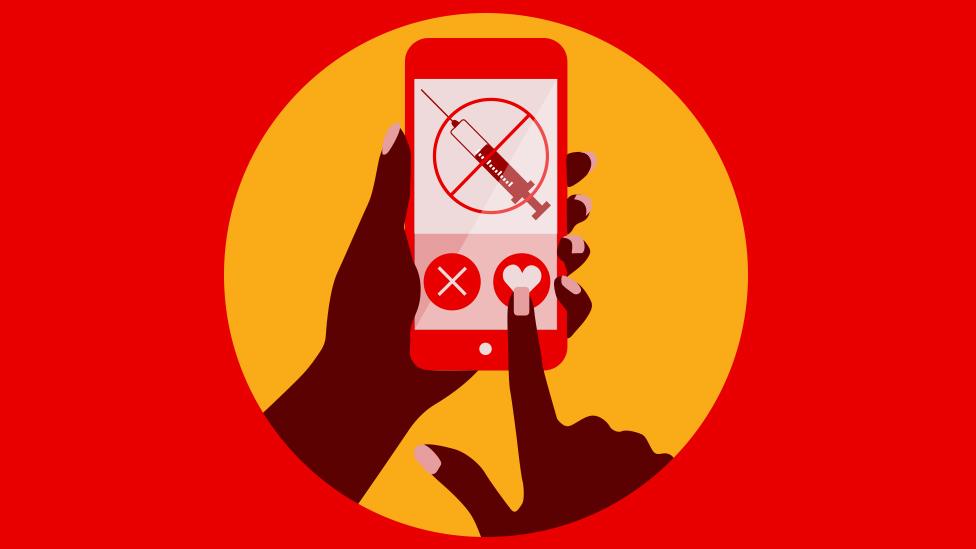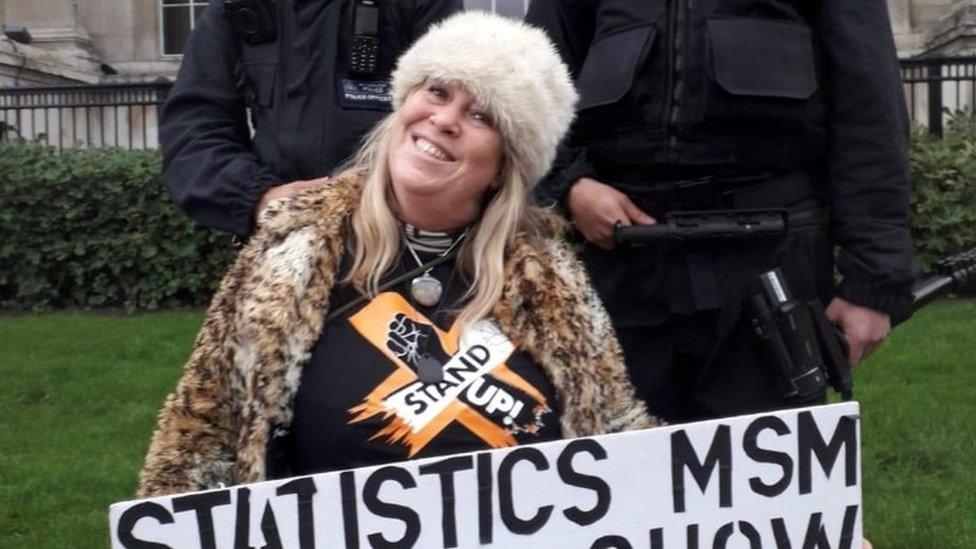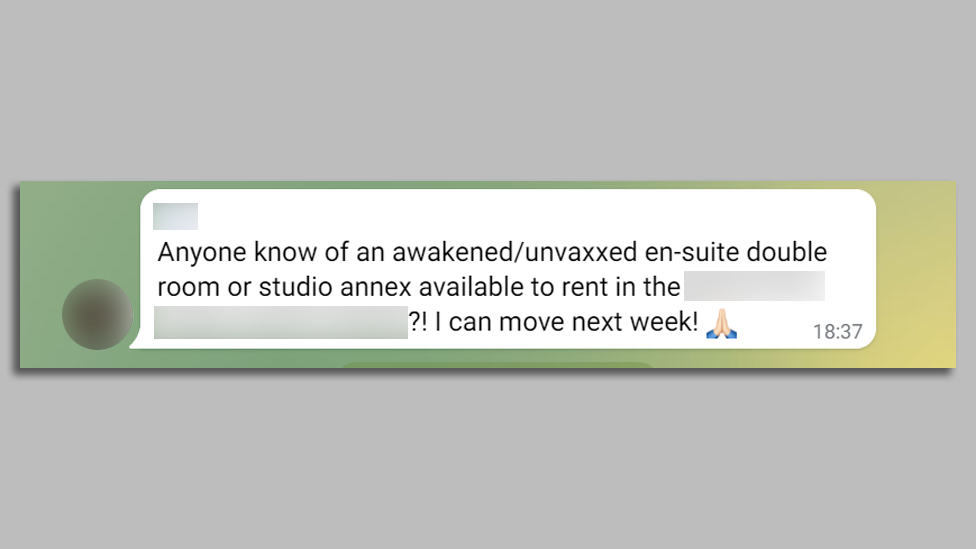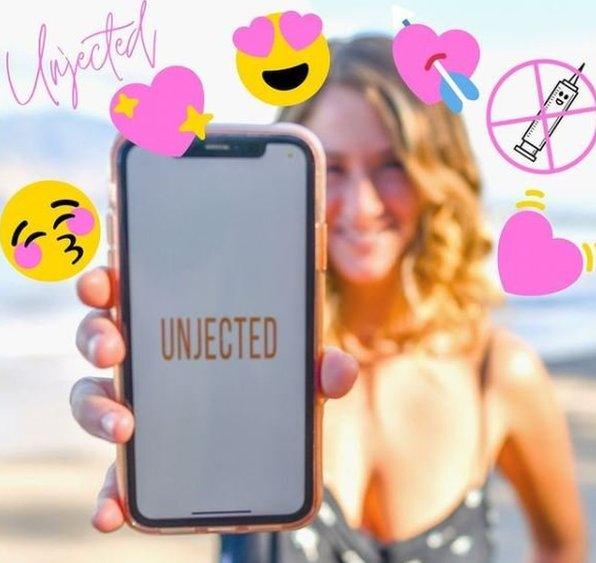How anti-vaxxers are living and loving in a Covid world
- Published

During the pandemic an international movement opposed to Covid-19 vaccines and restrictions has grown on social media, often muddled with conspiracy theories and dangerous falsehoods. Now some committed activists are pursuing a new direction - organising online dating, house shares and possibly even blood banks just for the unvaccinated.
"I mean, I'm not at that stage yet. I quite like the coffee shop and having my flat white," Michele explains, her blonde hair dancing in the blustery sea breeze as we sit by the beach in Brighton.
"But if the time comes, I'll give it all up."
She's not talking about quitting caffeine or giving up on chocolate. Michele is contemplating opting out of mainstream society altogether - because of her opposition to the Covid-19 vaccines.
"It's going to be like the people you see in the movies living on the other side of the city wall," she laughs.

Michele protesting
Michele is a leader of her local "freedom community" - which opposes Covid vaccines, lockdowns and other restrictions. She's also a landlord and has joined an online house share group set up for like-minded individuals.
It's one of a number of similar networks that we've discovered online . They are hubs of conversation punctuated with videos and posts containing dangerously misleading and unfounded claims about Covid jabs.
Many in these groups share a belief that the coronavirus pandemic has been concocted by a shadowy global elite for sinister purposes.
Concerns about vaccines - including totally unfounded beliefs that simply being near a vaccinated person can make you ill - are driving them to try to build online and offline communities away from the mainstream.
Activists are trying to establish elements of a parallel culture as an alternative to vaccinated society.
In Michele's case she's looking to rent one of the rooms in her property to someone who is unvaccinated.

A flat share post from an unvaccinated Telegram group
"It was such a good idea because if you're living in shared accommodation and the other people around you don't have the same views it could become a constant argument within the house."
Many of Michele's friends share that view and say they only want to live with people who are "awake", a buzzword for the movement.
"A lot of people believe there's a big shift happening in the world. This is a great turning point," Michele says.
"And it could go one way or the other. We could go down a very dark side, or we could go in on all we might end up having to sort of [living] two completely separate lives."
Michele says she wants to continue mixing with everyone. However, she shares the rising concern of many people who consider themselves to be "awake" that they are being persecuted for not having the vaccine.

A dating meme from an awake Facebook group
It's not simply a concern about government overreach, but a belief that they are suffering a "medical apartheid". That's a reference to the system of enforced racial segregation that existed in South Africa - a comparison which many people outside these circles would find offensive.
Awake culture is also manifesting itself in a growth in home schooling by parents, who fear their children will be jabbed at school without their consent or forced to wear masks.
"I have a friend, she's an ex-school teacher who had to leave because she went on protests and has now managed to lease some land, to have cabins with home schooling going on," says Michele.
"If my children were still at school I would probably take them out myself. So if people are going to take them out of the mainstream, we're going to set up alternative schools.
How do these groups organise?
In the past 18 months, big tech companies like Facebook and Google have been under increasing pressure to tackle false information about Covid-19. It means that many anti-lockdown and anti-vaccine groups have been banished from mainstream social media sites.
Some have migrated to the Telegram app where there is far less moderation. It's an environment in which conspiracy theories thrive and intermingle according to Joe Ondrak, who is head of investigations at Logically, a company that investigates misinformation.
"Due to Telegram's architecture as a platform, it's allowed a lot of very rapid cross-pollination between QAnon, wider conspiracy, anti-lockdown, anti-vaxx, and Covid denialism to the point where they are very rapidly informing one another, to become sort of a homogeny," he says.
Michele does a lot of her organising on Telegram, where channels have accumulated thousands of members across the world. But says she rejects the aggression found in numerous posts that use extreme and violent language against anybody seen as promoting vaccines.
We approached Telegram for comment but received no response.
Dating for the unvaccinated
While Telegram is a home for fringe groups, there have been attempts to bring the movement to a wider audience.
Unjected, created by two friends in Hawaii, Shelby Thomson and Heather Pyle, launched on both the Google and Apple app stores in May.
Users can find dating, housing and business opportunities, all for the unvaccinated only. There has even been discussion about the community organising its own blood bank and organ donations.
Ms Thomson explains how she was first inspired by the idea that unvaccinated people won't be able to participate in certain aspects of society.

Unjected has been downloaded in 80 countries
But those using the app are also driven by even more extreme views.
That includes the unfounded belief that physical proximity to vaccinated people can make them ill. It's a debunked theory known as "vaccine shedding."
Ms Thomson says it's a concern that makes many users seek romance only with other unvaccinated people.
"I would definitely say it has more to do with the very personal interactions and you know, sharing saliva or sleeping with somebody or any of those extreme close contact scenarios," said Ms Thomson.
But virologist Professor Nicola Stonehouse from Leeds University says that vaccinated people pose no health risk to the unvaccinated. And the scientific evidence suggests that in terms of Covid-19 it is safer to be around vaccinated people.
Like lots of the false theories floating around, "vaccine shedding" has a tenuous connection with reality.
When vaccines for other diseases were first developed, they worked by injecting patients with a weakened, or attenuated, version of the live virus. In very small numbers of cases, shedding is a real thing.
While rare, it was possible, in the past, to catch polio from someone who had recently been vaccinated. But the NHS website, external says: "This is no longer a risk in the UK because the vaccine used nowadays contains an inactive version of the virus."
Professor Stonehouse says more modern vaccines - and that includes all the vaccines that protect against Covid-19 - are not live attenuated vaccines.
"You can't spread the vaccine from person to person, and therefore, vaccine shedding in the context of the Covid-19 vaccines is just not possible," she says.
Where is this all going?
Unjected's founders say the app has been downloaded more than 18,000 times across 80 countries.
But earlier this month it was booted off the Apple app store for breaking the company's policies on Covid misinformation. Instagram also suspended Unjected's account.
Shelby Thomson says they now plan to concentrate their efforts on the Unjected website, where they have greater control.
"We're just a group of people that aren't going to be swayed," she says.

Zanzibar has been suggested as the location for an unvaccinated holiday resort
However, Unjected's experiences do suggest the online growth of the movement is likely to be constrained by the reluctance of big tech to tolerate Covid-19 misinformation on its platforms.
But that doesn't appear to be deterring prominent anti-vaxxers, who have even grander ideas.
There has been talk of creating a holiday resort in Zanzibar for the unvaccinated and a so-called "freedom airline". Plans of this scale would probably come into conflict with governments.
But even some smaller-scale schemes have failed to get off the ground. Organisers of an unvaccinated music festival scheduled to take place in England earlier this year was cancelled due to a lack of interest.
Leaving these online movements, though, for the most committed activists will not be easy.
"Sadly for a lot of people it's very hard to get out these kinds of world views and ideologies once you're in them," explains Chloe Colliver from the Institute for Strategic Dialogue. "That's not just because you're surrounded by that disinformation day in and day out, but also because it becomes your social network and your community."
Listen to BBC Trending: Anti-vaxxers only on the World Service. Download the podcast or listen online.